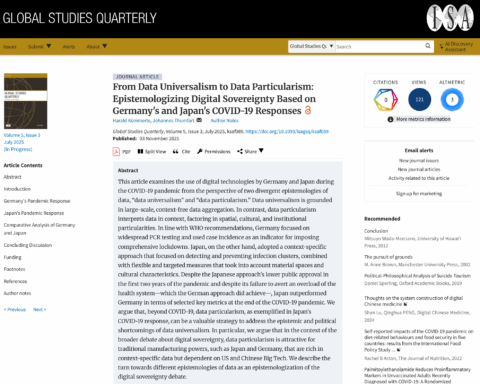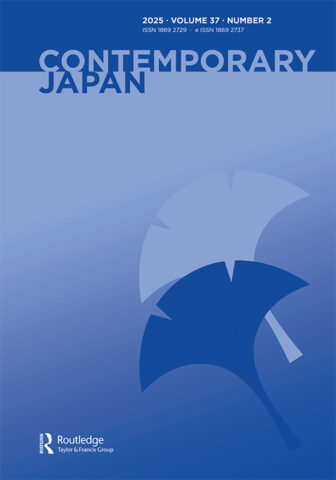イベント&アクティビティ
Book chapter by David M. Malitz on political decentralization in Thailand

Thailand is a highly centralized unitary state. Provincial governors are appointed by Bangkok’s Ministry of the Interior and local administrations rely heavily on central government transfers. This centralization reflects not only elite interests but also a political culture shaped by the kingdom’s transformation from a loosely integrated multi-ethnic empire into a centralized nation-state, first under European imperial pressure and later during the Cold War. As David M. Malitz shows in “A Kingdom ‘One and Indivisible'”, debates about political decentralization date back to the early twentieth century and resurfaced particularly during the period of democratization in the 1990s as well as after the 2014 military coup. Japan has repeatedly been referenced in these debates and the Japan International Cooperation Agency provided capacity-building programs for local authorities in the 2000s to support decentralization efforts. His chapter is published in From Empire to Federation in Eurasia. Ideas and Practices of Diversity Management (Routledge 2026).
Book chapter by Dolf Neuhaus explores industrial education in colonial Korea

Vocational and industrial training loomed large in Japanese colonial education in Korea. Between 1910 and 1945, Japanese authorities implemented an education system that concentrated on industrial education for Koreans, who were generally portrayed as possessing a low level of civilization. Geared toward assimilating Koreans as Japanese subjects, this system was characterized by segregation and discrimination with severely restricted access to higher education for Koreans. Comparing the perspectives of missionaries, Korean students, and Japanese colonial authorities, Dolf-Alexander Neuhaus‘ book chapter “Training the Heart, the Head, and the Hand”: Colonial Education, Missionaries, and Industrial Schools in Korea, 1906–1930 examines the YMCA’s pioneering role in industrial education as a site where Protestant work ethics, Korean aspirations for modernization, and colonial policy converged — and sometimes directly conflicted. The chapter is published in The Gospel of Work and Money. Industrial Education and Its Global Legacies, edited by O. Charbonneau and K. V. Walther (University of Pennsylvania Press 2026).
Neues Buchkapitel von David M. Malitz zu Buddhismus und japanisch-siamesische Beziehungen

DIJ-Forscher David M. Malitz hat das Kapitel “‘Länder der gleichen Religion’? Der Buddhismus und die japanisch-siamesischen Beziehungen im Zeitalter der absoluten Monarchie Siams” beigetragen zum Sammelband Wege, Sehepunkte, Panoramen. Japanologische Festschrift für Klaus Vollmer (Hg. Steffen Döll, Hamburg: Gesellschaft für Natur- und Völkerkunde Ostasiens). Das Kapitel untersucht die Rolle des Buddhismus in der frühen Phase der modernen japanisch-thailändischen Beziehungen und stützt sich dabei auf Primärquellen aus Japan und Thailand. Der Schwerpunkt liegt auf dem Zeitraum von der Aufnahme formeller diplomatischer Beziehungen im Jahr 1887 bis zur Verfassungsrevolution von 1932. Obwohl der Buddhismus häufig als gemeinsamer kultureller und religiöser Bezugspunkt herangezogen wurde, zeigt das Kapitel, dass auch doktrinäre Unterschiede und divergierende klösterliche Praktiken zwischen den japanischen Mahāyāna-Schulen und dem siamesischen Theravāda-Buddhismus eine entscheidende Rolle spielten, um Fragen der nationalen Identität, der Hierarchie in den Außenbeziehungen, der Modernität und der politischen Legitimität innerhalb der buddhistischen Welt zu verhandeln. Die Festschrift ehrt den seit Sommer emeritierten Japanologen Klaus Vollmer (LMU München).
DIJ Newsletter Winter 2025/26
 Innovation, games, machizukuri, climate, and ‘the mouse’: the winter issue of our DIJ Newsletter features updates on our research, publications, and events as well as news from the Institute, our team, and our outreach activities. We hope you will enjoy exploring this new edition of the DIJ Newsletter. If you haven’t done so yet, you can subscribe to receive our Newsletters directly to your inbox. The full issues and subscription form are available here.
Innovation, games, machizukuri, climate, and ‘the mouse’: the winter issue of our DIJ Newsletter features updates on our research, publications, and events as well as news from the Institute, our team, and our outreach activities. We hope you will enjoy exploring this new edition of the DIJ Newsletter. If you haven’t done so yet, you can subscribe to receive our Newsletters directly to your inbox. The full issues and subscription form are available here.
New book chapter and article by Harald Kümmerle on Mathematical Knowledge and Digital Sovereignty

Two new studies by DIJ researcher Harald Kümmerle were recently published. His book chapter “Bridging Göttingen and Tokyo: Oral Culture and the Dynamics of Mathematical Knowledge”, published in Felix Klein’s Foreign Students. Opening Up the Way for Transnational Mathematics (Birkhäuser Cham 2025), examines the reception of Felix Klein’s school of mathematical productivity in Japan, particularly at Tokyo Imperial University, whose central position within Japan contrasts with Göttingen University’s peripheral position within Germany. The study focuses on the work of two Japanese mathematicians, Tsuruichi Hayashi and Takuji Yoshiye. Harald’s article “Datenströme und Raumordnung. Japans Regulierungsmodell im globalen Kontext” (Data flows and spatial order. Japan’s regulatory model in a global context), published in German in the Zeitschrift für Digitalisierung und Recht (4/2025), studies how data flows are embedded in geographical and economic orders and constitute spaces themselves. Focusing on developments in Japan, the article shows that data flows are not only technical or regulatory objects, but space-constituting phenomena in which Japan’s consensus-oriented regulatory model appears as a relevant factor in global order-making.
Open access article co-authored by Harald Kümmerle studies use of digital technologies by Germany and Japan
 How have Germany and Japan used digital technologies during the COVID-19 pandemic? From the perspective of two divergent epistemologies of data, the open access article “From Data Universalism to Data Particularism: Epistemologizing Digital Sovereignty Based on Germany’s and Japan’s COVID-19 Responses” (Global Studies Quarterly, Vol. 5, Issue 3) by DIJ’s Harald Kümmerle and (Brussels) compares both countries’ use of data and their responses to the pandemic. Observing that Japan outperformed Germany in terms of selected key metrics at the end of the COVID-19 pandemic, the article argues that data particularism, as exemplified in Japan’s COVID-19 response, can be a valuable strategy to address the epistemic and political shortcomings of data universalism. In particular, the authors argue that in the context of the broader debate about digital sovereignty, data particularism is attractive for traditional manufacturing powers, such as Japan and Germany, that are rich in context-specific data but dependent on US and Chinese Big Tech.
How have Germany and Japan used digital technologies during the COVID-19 pandemic? From the perspective of two divergent epistemologies of data, the open access article “From Data Universalism to Data Particularism: Epistemologizing Digital Sovereignty Based on Germany’s and Japan’s COVID-19 Responses” (Global Studies Quarterly, Vol. 5, Issue 3) by DIJ’s Harald Kümmerle and (Brussels) compares both countries’ use of data and their responses to the pandemic. Observing that Japan outperformed Germany in terms of selected key metrics at the end of the COVID-19 pandemic, the article argues that data particularism, as exemplified in Japan’s COVID-19 response, can be a valuable strategy to address the epistemic and political shortcomings of data universalism. In particular, the authors argue that in the context of the broader debate about digital sovereignty, data particularism is attractive for traditional manufacturing powers, such as Japan and Germany, that are rich in context-specific data but dependent on US and Chinese Big Tech.
DIJ Newsletter Autumn 2025

The autumn issue of our DIJ Newsletter features updates on our research, publications, and events as well as news from the Institute, our team, and our outreach activities. We hope you will enjoy exploring this new edition of the DIJ Newsletter. If you haven’t done so yet, you can subscribe to receive our Newsletters directly to your inbox. The full issues and subscription form are available here.
New issue of Contemporary Japan published

The new issue of Contemporary Japan includes six original research articles plus our book review section, covering topics ranging from religion and politics to education, women’s empowerment, elderly workers, and Takarazuka fans. The research articles include “faith talk” in Japanese political rhetoric (Ernils Larsson), the “afterlife” of prime ministers, particularly Satō Eisaku (Taro Tsuda), an ethnographic study of a Korean international school (Kunisuke Hirano), literacy movements and female empowerment among Buraku (Chiara Fusari), elderly reemployment (Kazue Haga), and a spatial analysis of Takarazuka fandom (Zuzanna Baraniak-Hirata). Our book review section includes a monograph on the history of the Japanese destroyer Yukikaze (reviewed by Samuel P. Porter) and a handbook on postwar Japan (reviewed by Florian Coulmas).





 Open Access
Open Access
